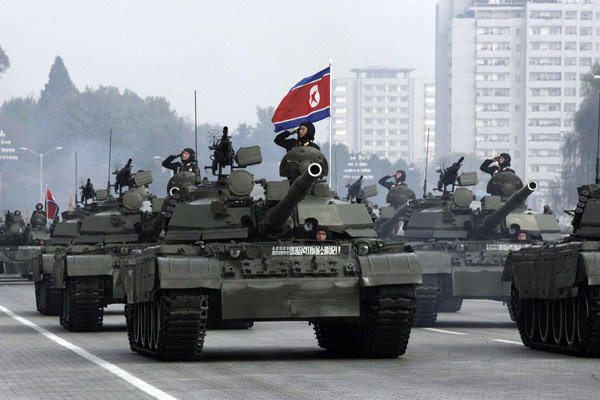According to the Global Firepower Index, North Korea’s military is ranked 23rd in the world. A war between the United Nations and North Korea would jeopardize the peace and prosperity of the Asia Pacific region. North Korea has been spending most of its GDP on defense since its emergence as an independent nation. Although it is a small country in terms of economy, population and geography, it has maintained a large military of 6,445,000 men and women with arms, 5025 tanks, 4300 artillery pieces, nearly 944 military aircrafts, an armada of 76 submarines and 10 to 20 nuclear weapons. Lack of technological sophistication is the major weakness of its military.
Economically North Korea is the most underdeveloped country in the Asia Pacific region. The United States has the unchallenged military capabilities to punish the North Korean Hermit regime but an attack on Pyongyang would put South Korea in a dangerous situation of annihilation.
North Korea has a large number of artillery pieces, hiding in tunnels and caves near the DMZ, which is only thirty-five miles from Seoul. Pyongyang can send thousands of artillery shells into South Korea armed with conventional explosives as well as chemical and biological agents.
According to the South Korean 2016 white paper, North Korea has nearly 2500 to 5000 tons of biological and chemical weapons, which includes sarin, smallpox, anthrax, and plague. North Korea’s military is also capable of delivering missiles armed with sarin nerve agent to anywhere in South Korea. In case of a war with the North, South Korean citizens are highly vulnerable to WMD attack.
If a war begins with a US preemptive strike on North Korean missile and nuclear infrastructures; and Beijing decides to help its long terms ally, the consequences would be a devastating war between China and the United States. There is a high probability that China would intervene in the war like it did in the first Korean War because the geopolitical setting of the Korean peninsula today remains the same as it was in the 1950s.
During the first Korean War, the total death toll including civilians was more than two million. The United States and China lost around 34000 and 132000 military personnel respectively. A second Korean War will be far more devastating than the first one if escalation ladder gets out of control. Another two million or more people would be dead by this time. So, the international community must find a diplomatic solution to the problem. The UN General Assembly and Security Council should play leading roles in averting the impending security crisis.

Md. Aslam Hossain is a part-time senior editor of The Geopolitics. He is also an entrepreneur. He has earned his Bachelor of Arts and Master of Arts in International Relations. His focus is on geopolitics and security.


